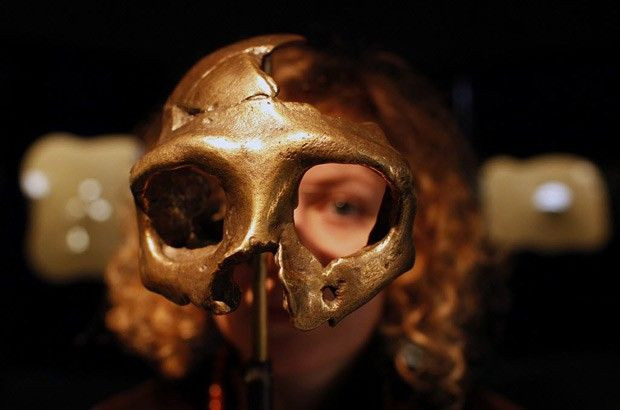Non-African Heritage Equals Neanderthal Genetics, Study [PHOTOS]

If you have African heritage, then a recent study suggest you are not part Neanderthal, but rather part of a separate population. The latest research has proven that all non-Africans possess fragments of the Neanderthal (Neandertals) genetic code.
As late as 2010, researchers were trying to prove or disprove whether there was enough substantial evidence to link modern-day humans to Neanderthals. The DNA evidence to suggest that breeding occurred provided evidence for both sides: to prove or disprove that mating occurred.
Until now, the Neanderthal genome which had been examined fell outside the variation found in modern-day humans, concluding that there was no evidence for breeding. However, progress in the study was limited due to the rarity of uncontaminated Neanderthal samples.
But a study conducted in 2009 found that mtDNA genetic diversity in Neandertals that lived 38,000 to 70,000 years ago was approximately one-third of that in contemporary modern humans.
Now, recent research proves that non-Africans are part Neanderthal.
Damian Labuda, of the University of Montreal's Department of Pediatrics and the CHU Sainte -Justine Research Center, had been conducting research with his colleagues to determine whether or not the human X chromosome originated from Neanderthals. His study concluded that the X chromosome does originate from Neanderthals, but only in non-Africans.
The evidence is significant for two primary reasons: first, it confirms that modern humans and Neanderthals interbred at some point, and second, it shows that Neanderthal life, as a species, has continued through modern-day humans.
David Reich, an associate professor of genetics at Harvard stated, Neanderthals live on in non-Africans.
Reich, an expert on population geneticist at the Broad Institute of MIT and Harvard, analyzed Neanderthal fragments from bones found in Croatia, Germany, Russia and Spain. Reich and his colleagues studied over one billion Neanderthal DNA fragments, concluding that, At least some Neanderthals were absorbed into the modern human population.
The team was able to piece together over 60 percent of the entire Neanderthal genome, using special DNA fragments which had undergone anti-contamination measures.
The Neanderthal DNA was compared to present-day humans from South Africa, western Africa, China, France and Papua New Guinea.
According to our results, the ancestors of Neanderthals and modern humans went their separate ways about 400,000 years ago, said Jim Mullikin, a computational geneticist at the National Human Genome Research Institute, via Discoverynews.com.
The study also showed that the Neanderthal DNA matched most closely with the individuals from China, France and Papua New Guinea. The interbreeding would have occurred before the humans left Africa and began colonizing distant regions in Europe and Asia.
The research shows that humans and Neanderthals overlapped in Europe, and remains have been found for human individuals with Neanderthal-type features. Though the research cannot provide an exact date as to when and where the overlapping occurred, it suggests that humans and Neanderthals encountered each other again 40,000 - 80,000 years ago in the Middle East.
Some facts about Neanderthals:
- The average brain size of a Neanderthal was equal to or greater than that of the average modern-day man.
- Neanderthals are characterized by having a skeletally robust, muscular figure, with a protruding mid-facial region.
- Neanderthals are often called Homo sapiens neanderthalensis, or Homo neanderthalensis.
- Evidence suggests that Neanderthals lived in tight-knit nuclear families.
- Neanderthals carried the gene for language, and it has been suggested that they had an apt for music, art and craftsmanship skills, similar to modern-day humans.
- The morphological features of a Neanderthal can be found in European fossils dating back to 400,000 years. Over time, more distinct characteristics evolved.
- Roughly 30,000 year ago, Neanderthals disappeared from fossil records.
ALSO READ: The Deadly Perils of Black Magic in Benin, Africa
© Copyright IBTimes 2024. All rights reserved.




















